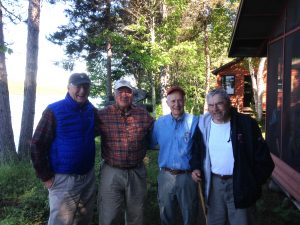
Mondale. Meyer, Millard, and Munger @ Elsie Lake.
They are old men now. Actually, they are very old men now. But in their day, they were (collectively) a Vice President (and Senator, Ambassador to Japan, and Minnesota Attorney General); a criminal defense lawyer, fur trapper, and gemologist; a Peace Corps diplomat, economist, and outdoors enthusiast; and a plaintiff’s lawyer, Democratic delegate to the 1968 National Convention, and avid hunter/fisherman. They range in age; from Harry Munger, the eldest, to Bruce Meyer, the youngest; 89 to 83. Mondale is 87 and Millard, a mere 85. They have battled cancer, heart attacks, stomach ailments, bowl disease, loss of spouses and children, and a host of other conditions through their “golden years”. Their vision has dimmed and their hearing is sometimes non-existent. Two of the four use C-Pap machines to sleep at night. Their gaits are unsteady: quiet, slow steps to avoid catastrophic falls. And yet, there they are standing on the wooden dock outside Ignace Airways, waiting to board a DeHavilland Otter for a short flight, a flight all of them relish and remember from years of fishing together. They are headed to Elsie Lake in the backwoods of Ontario. The “younger” guys, two men in their late fifties and early sixties (myself and Sammy Perrella), help the fertile octogenarians into the Otter and claim seats. The Otter slips away from the pier. Randy, the bush pilot, fires up the powerful single engine that will lift tons of humanity, gear, and food into the still Ontarian air. And then, they are airborne, returning to the Litman Camp for another week of walleye fishing.
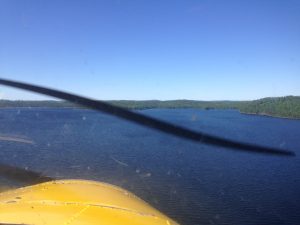
Flying into Elsie Lake.
Ross and Jay Litman, two of the four children of Judge Jack and Helen Litman, the camp having been left in the confident hands of the Litman children upon the deaths of the patriarch and matriarch of the family, greet the Otter as it lands. The plane is quickly unloaded. Mike, who is married to Mara-the only Litman daughter, stands on shore, waiting to leave. We pack his gear, some bags of trash and recyclables onto the plane, and Randy shuts the door, ready to depart. The Otter’s piston-driven engine revs. The old sheet metal of the cowling rattles. The newly arrived pick up our bags and begin the process of settling in.
My wife and I spent our honeymoon here back in August of 1978. Oh, we weren’t alone in the Canadian bush. The entire Litman, Munger, and Mondale families, along with the Secret Service, the Royal Canadian Mounted Police, and an Ontario Provincial Police officer or two camped with us to provide security for the then-Vice President. My wife hasn’t been back to visit but I’ve been privileged over the past decade to join the four fertile octogenarians, sometimes accompanied by neurosurgeon Dr. Bob (Robert Donley, M.D.), Sam Litman (Jay’s son), and Tony (Sammy Perrella’s son) for five or six days in paradise.
In the bunkhouse, I claim a top bunk and roll out my sleeping bag. The old men do the same. Despite the ages of my bunkmates, the banter is lively and nearly constant. That evening, Ross, Jay, and Sammy man boats to transport us to the walleye “hotspots” for the evening bite. Elsie does not disappoint yielding fish after fish after fish to jigs and spinners tipped with minnows and worms. After a long drive, a short flight, and a few hours of excitement, we eat a hearty dinner and tumble into bed.
The menu and the cooking (handled by Jay and Sammy and Ross) is always exemplary. We eat big, hot breakfasts including eggs, bacon, French toast, blueberry pancakes, egg McMuffins, and sausage. Lunch is a rarity. Dinners this trip include hamburgers and brats, filet of beef, Sammy’s pasta, Sammy’s pizza, fresh fish, barbecue ribs, brisket, and assorted side dishes. There’s not a restaurant in the U.S. or Canada that can top the fare at the Litman Camp. George and I are the designated dishwashers. Everyone, regardless of age or infirmity, pitches in to clean and organize before we leave. Ross, as always, is a whirling dervish of energy, constantly on the move. Jay, to his credit, tinkers, using a methodical approach to repairing the things that need repair.
The political discussions around the dinner table? With an “interesting” election brewing and a former candidate for President in attendance, well, let’s just say that the dialogue becomes spirited; the observations, crystalline.
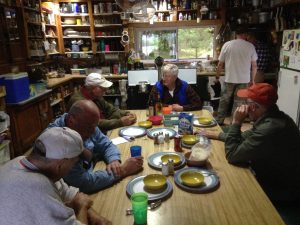
Mondale holding court at the dinner table.
Despite rainy, cold weather, everyone catches fish.
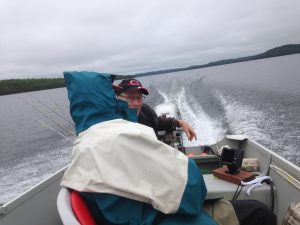
George and Ross head out to fish.
One afternoon, Ross and I take a detour and end up talking to the only neighbor on Elsie Lake. Imagine, if you can, a lake the size of Fish Lake (near where I live) with only two fishing camps on its beautiful shores. Then take away road access, requiring everyone and everything that comes onto the lake to be either flown in or, during the depths of the Canadian winter, hauled in over the ice via snowmobile. That’s Elsie. Anyway, back to the narrative. Ross and I pull up to the only other dock on the lake to say hello to Ava, the owner. It’s supposed to be a short, “how-do-you-do” session. Instead, the very slight septuagenarian asks us to join her on the deck. I ask the old woman about her personal history and she launches into a story of escape from East Germany, the foreign accent beneath her well-formed English buttressing her words. It’s a harrowing ordeal that ends with Ava escaping to Canada and her mother being shot by a neighbor working as a border guard. Motherless, and having left her father behind, Ava relates a tale of heroism, kindness, pluck, and fortitude that someday might find it’s way into a Munger short story or novel. We thank the old woman for her hospitality and leave, the two of us happy to have learned something of her mettle.
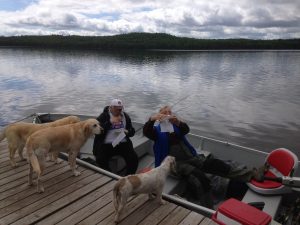
Coneys in the boat. Munger and Mondale.
On the only day the sun comes out (except, of course, for the day we leave!) Jay and I motor the pontoon boat across the lake to fish for smallmouth bass. My gold spinner tipped with a nightcrawler or a minnow is an instant hit. I pull in big smallies every fourth or fifth cast. Jay catches a few on flies. The bass are on their nests, depressions created by the fish to lay eggs in Elsie’s cold water. The fish are readily visible, hovering above their nests, aggressively protecting their defined territory. The fish aren’t hungry: just pissed off at our intrusion. It’s an afternoon spent hauling in one and two pound smallies, the fish snapping viciously at our offerings, diving deep and leaping high into the still Ontario air when hooked.
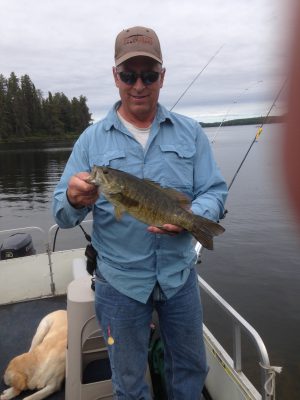
Typical Elsie smallie caught by Jay on a fly.
Over the week, we catch a few lake trout, some whitefish (pound for pound the hardest fighting fish I’ve ever tied into), oodles of walleye, tons of bass, and the occasional lunker northern pike (Bruce landing one over twelve pounds). Nearly all the fish go back into the lake with the exception of a few walleye used for the evening fish fry the night before we leave and a few fillets for the fertile octogenarians to take home.
Ever constant and nearby are the dogs: Devin, Jada, and Lilly. The two Labs, Jada and Lilly, can be found under the table at every meal, waiting for Harry to drop them a treat or two. During fishing hours, the dogs are out on the water, keeping their human companions company.
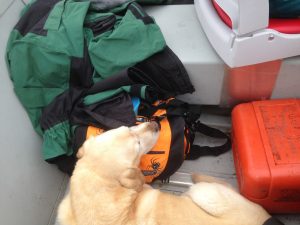
Jada napping on the long ride to the river.
One night, after sufficient reflection and libations, we come up with a plan. Ava, it seems, is in need of a husband. Our collective genius devises a scenario where George, a widower, might be willing to “take one for the team” by proposing marriage to the elderly refugee if, and this of course, is the key, her fish camp is part of her dowry. The plan is never implemented though George seems willing to give it a go. And that’s where the term “fertile octogenarian” manifests: in our rousing discussions of how and when the marriage might, if ever, be consummated.
In our travels, we see an otter scoping us out and bald eagles and countless ducks and geese in flight. Resident loons locate a school of bait fish just off the Litman dock and feed and call for hours. Ross points out native orchids, Minnesota’s state flower, the showy lady slipper, as we walk a wooded trail. A tree frog makes itself known. On the ride from Thunder Bay to Ignace, we see a cow moose grazing in a roadside swamp. There is no question we are in wilderness despite all the fine food, noisy chatter, and relative comforts the camp offers.

Tree frog.
“I hate having to do this,” Ross says as he dismantles his rods and reels. We are packing for departure when the Sheriff of St. Louis County utters his lament. Indeed. The next morning at 11:00am sharp the Otter and a Beaver will be idling on the now calm water, waiting to fly us back to Ignace. Five days spent with wisdom, age, and good people will have come and gone. But the memories? Ah, they will be with us forever.
Peace.
Mark

Lady slipper on the trail.
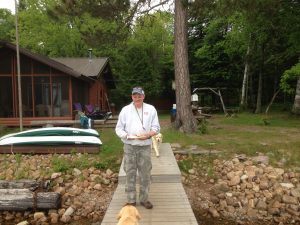
Sammy delivering conies to the old guys.


